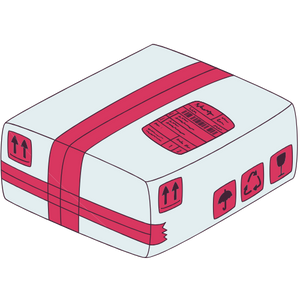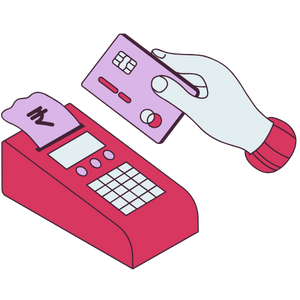Sudden changes in your menstrual cycle: understanding the causes and finding solutions
Have you noticed sudden changes in your menstrual cycle? A cycle that used to be regular is suddenly off? Longer or shorter, the female menstrual and hormonal cycle can go through many changes.
Many women and girls experience changes in their menstrual cycle at some point in their lives. You’re not the only one going through this! Sudden changes in the menstrual cycle affect many women at different stages of life.
Understanding why your body is reacting this way and how to cope is essential for protecting your physical and emotional well‑being. In this new guide, we help you untangle the many factors that can disrupt your cycle and offer tailored solutions to help you regain balance.
In this article, you’ll find:
I - Possible causes of a sudden change in the menstrual cycle
Menstrual cycle disorders can have many different and varied causes.
✣ Hormonal and physiological factors 🔄
Our body is wonderfully complex, especially when it comes to our hormonal system!
Puberty and perimenopause 🌸
These two transition periods are often accompanied by particularly irregular cycles. In adolescence, during puberty, your body is learning to regulate your hormones, and that can take some time. So a teenage girl’s first periods are often irregular. Having the right period protection on you at all times is even more important so you’re never caught off guard! Don’t miss our range of teen period panties!
Likewise, as you approach menopause (usually between ages 45 and 55), hormonal imbalance can start several years before your periods stop for good. This phase therefore comes with various menstrual issues. There’s no need for excessive worry.
Pregnancy and postpartum 🌸
Which Louloucup period panties are the best?
Thyroid disorders 🌸
Your thyroid (a small butterfly-shaped gland at the base of your neck) plays a crucial role in regulating many bodily functions, including your menstrual cycle. Hyperthyroidism can cause lighter and less frequent periods, while hypothyroidism can lead to heavier and longer periods.
Louloucup recommends ...
- Very heavy‑flow Liv period panties 😍
- Plain black. 🖤
- Completely invisible, it’s seamless and super discreet!
- No visible lines under clothing, it’s smooth and thin.
- Lined with organic cotton, it’s ultra soft and very comfortable. 🪽
- Available from XXS to 5XL (perfect for teens and plus sizes)! 📏
- Zero damp feeling, zero odor, zero leaks. 😇
- Extremely absorbent (equivalent to 5 regular tampons).
- Do you love seamless period underwear? So do we! Check out our other styles (Émilie and Gaby!)
✣ Lifestyle-related factors 🏃♀️
Our daily life, activities and lifestyle have a major impact on our hormonal balance, our periods and our menstrual cycle.
Stress and anxiety 💭
Chronic stress can disrupt the production of the hormones that regulate your cycle. Stress from work, exams or particularly intense personal situations has a major impact on menstruation. The same goes for very heavy emotional shocks, such as the death of a loved one, an accident, etc.
Weight changes 💭
Significant weight loss or gain can affect the production of oestrogen. Fat cells help produce these hormones – so too much or too little body fat can disrupt your cycle.
Intense exercise 💭
Elite athletes know this phenomenon well: very intensive training can sometimes lead to amenorrhoea (absence of periods). This is due to a decrease in body fat and the hormonal changes associated with intense exercise.
✣ Medical factors 🩺
Finally, certain infections or illnesses can influence and disrupt the menstrual cycle.
Hormonal contraception 💊
The start, stop or change of hormonal contraception can cause major changes in your cycle. This is especially true when stopping the pill: your body needs time to find its natural rhythm again.
Endometriosis and uterine fibroids 💊
These female and gynecological conditions can cause irregular or particularly heavy bleeding. Endometriosis affects around 10% of women of reproductive age and often remains undiagnosed for years.
Infections and illnesses 💊
Certain sexually transmitted infections, pelvic infections or other health problems can cause changes in your cycle. These changes are often accompanied by other symptoms such as pelvic pain or unusual discharge.



II – Solutions and treatments for sudden changes in the menstrual cycle
Medical approaches 💉
If your menstrual cycle is changing significantly, seeing a healthcare professional is the first step. Depending on the cause identified, different solutions can be suggested:
Hormone Therapy
To regulate a disrupted menstrual cycle, your doctor may prescribe progestins or a suitable hormonal contraceptive. These treatments help stabilise hormone levels and restore a more predictable cycle.
Surgery
In some cases, such as fibroids or advanced endometriosis, surgery may be recommended to address the underlying problems that are disrupting your cycle.
Treatment of infections
If an infection is the cause, an appropriate antibiotic or antifungal treatment will resolve the problem and, as a result, restore a normal cycle.
Natural approaches and lifestyle adjustments 🌿
Stress management
Incorporate relaxation techniques like yoga, meditation or deep breathing into your daily routine. Even 10 minutes a day can make a significant difference to your stress levels and, in turn, the regularity of your cycle.
Balanced Diet
A diet rich in essential nutrients supports **hormonal balance**. Prioritize foods high in omega‑3s (fatty fish, flaxseeds), zinc (seafood, legumes), and B vitamins (whole grains, leafy greens).
Moderate Exercise
Regular but moderate physical activity supports a healthy menstrual cycle. Aim for 30 minutes of exercise most days of the week, but avoid overly intense training if you notice it disrupts your cycle.
III - Adapting to the unexpected with suitable protection 🩰
Faced with these unpredictable changes, it’s essential to have reliable, adaptable period products—comfortable, discreet protection you can trust. Louloucup period panties are an ideal solution when your cycle becomes irregular:
They adapt to all menstrual flows, even when it suddenly changes.
Made from organic cotton, they respect your intimate area, even when it’s more sensitive.
Available in several absorbency levels, they meet all your needs, in every situation.
Their comfort allows you to handle cycle disruptions with peace of mind.
Practical: you can slip a clean pair of panties into your bag and always have a backup on hand.
Top 3 black Louloucup period panties 😍
IV – Diagnosis and medical follow‑up 📋
Menstrual cycle disorders: when should you see a doctor?
It’s important to see a healthcare professional if you notice:
periods that are so heavy you need to change your protection every hour,
bleeding between periods or after sex,
cycles that become significantly shorter (less than 21 days),
no period for more than 3 months (if you’re not pregnant or menopausal),
intense pelvic pain.
Additional tests
blood hormone tests,
a pelvic ultrasound,
a thyroid assessment,
other specific tests depending on your symptoms.
V – Prevention and precautions 🛡️
Tips for keeping your menstrual cycle more regular
- Maintain a stable and healthy weight.
- Manage your stress day to day. Don’t let it win—take control of it.
- Adopt a balanced diet rich in antioxidants.
- Avoid excessive alcohol and caffeine.
- Do regular but moderate physical activity.
Importance of follow-up
Keeping a journal of your menstrual cycle can help you spot patterns and potential triggers. Many free or paid mobile apps are now available. Very practical, they let you keep a personalized log of your emotions, sensations and pain. Most combine a menstrual calendar with your most fertile days. Keeping such a journal can help you better understand your symptoms and explain everything you’re feeling to your doctor.
VI – Our practical solutions for handling the unexpected 🧘♀️
When your menstrual cycle becomes unpredictable, managing your period day‑to‑day can become a source of anxiety. Here are some practical tips:
Choose safe, trustworthy period products
The Louloucup menstrual cups are perfect for adapting to changes in flow. Available in two models (soft or classic) and two sizes, they can collect up to three times more blood than a tampon and can be worn for up to 6 hours.
For extra peace of mind, you can also opt for combined protection: a cup paired with backup menstrual panties in case of a particularly unpredictable flow.

The key? Anticipation!
“So happy I finally took the plunge and tried period underwear!! Amazing product, very comfortable to wear. You forget you even have your period. And it lasts 12 hours with no problem despite a very heavy flow on day 2. No more unpleasant odors. And the care routine is much easier than I thought.” Marion G.
Listen to your body and take care of yourself 💖
Changes in your menstrual cycle are often signals your body is sending you. Far from being just inconveniences you have to put up with, they can be valuable indicators of your overall health.
Don’t hesitate to consult a healthcare professional if these changes worry you. In the meantime, take care of yourself, adjust your lifestyle and choose comfortable, reliable period protection that will support you whatever happens.
Your cycle is an integral part of your femininity – learning to understand it and live in harmony with it is an important step towards greater wellbeing.
For a complete period routine, you’ll need:
FAQ: Menstrual cycle disorders
Is it normal for my menstrual cycle to change completely after years of being regular?
Changes can occur at any age, but after a long period of stability, it’s recommended to see a doctor to rule out any underlying problem.
Can contraception stabilize an irregular menstrual cycle?
Yes, some hormonal contraceptive methods can help regulate a disrupted menstrual cycle, but they must be prescribed by a doctor who will assess your individual situation.
Can dietary changes really influence my menstrual cycle?
Absolutely! What you eat has a direct impact on your hormonal balance. Nutritional deficiencies can disrupt your menstrual cycle, while a balanced diet helps keep it regular.
How do I know if my menstrual cycle changes are linked to perimenopause?
Perimenopause can start several years before menopause, usually after age 40. If you’re in this age range and you’re noticing other symptoms like hot flashes or mood swings, perimenopause could be the cause.































